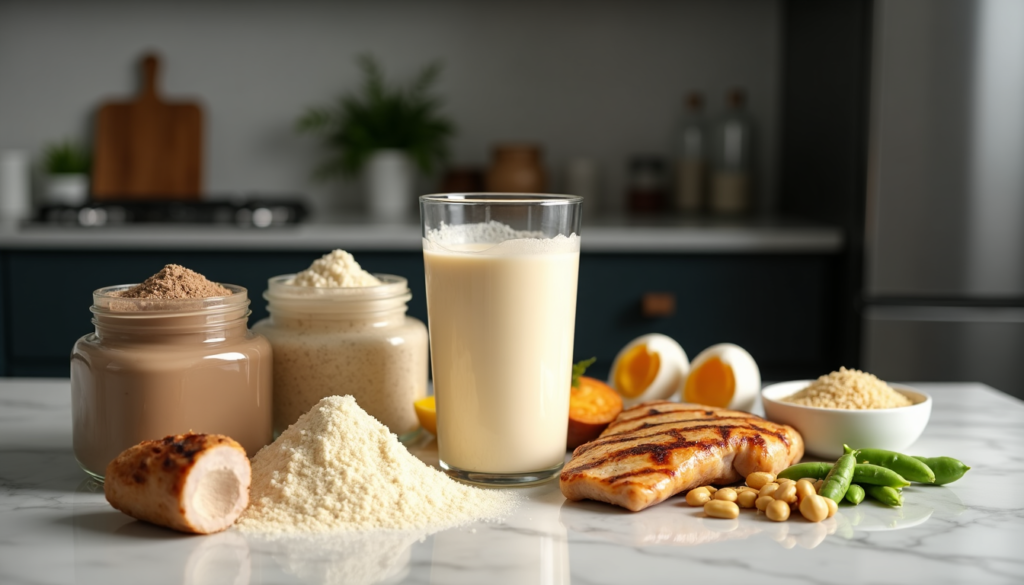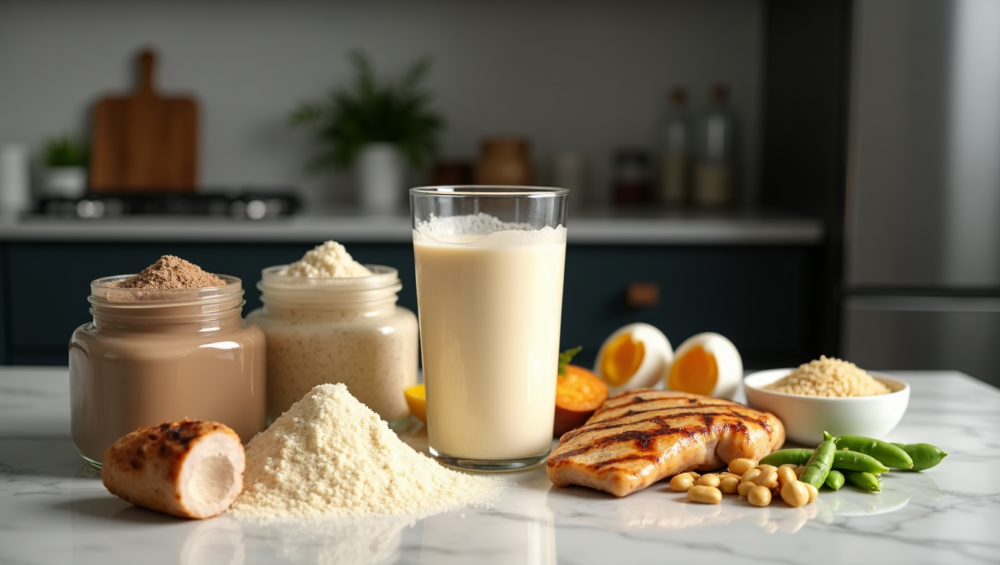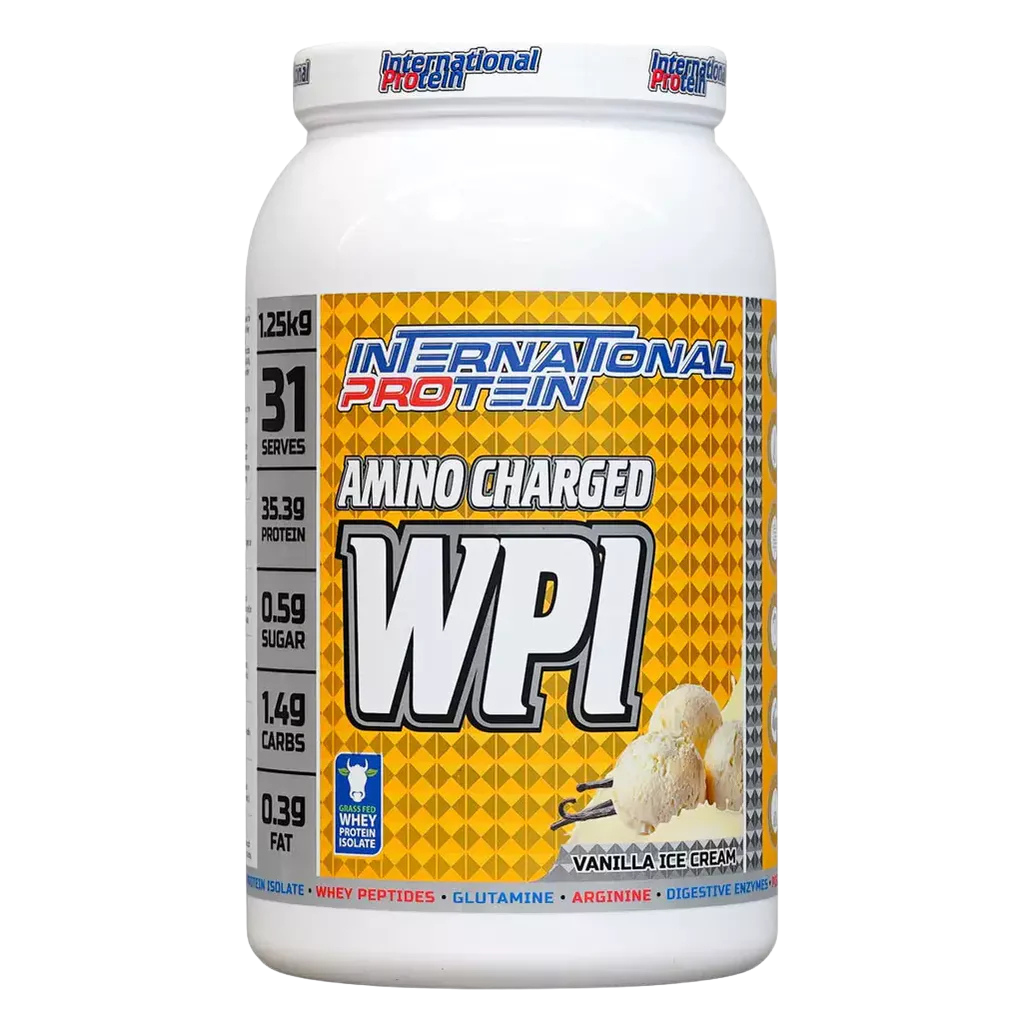Protein powder sales hit £4.14 billion in 2018, and you might wonder if these supplements are good for you. These products keep gaining popularity, especially among fitness enthusiasts and athletes who want to boost their strength and muscle mass.
But quality varies widely among protein powders. Some products offer an impressive 10 to 30 grammes of protein per scoop, but others contain high levels of added sugars and harmful substances. Recent studies found that 75% of tested protein powders had traces of lead, and one product showed 25 times the allowed limit of BPA.
This piece gets into the benefits and what it all means when you consume protein powder. You’ll find what goes into these powders, how they affect your body, and if they deserve a place in your daily nutrition routine.
Is protein powder good for you?
Protein powder supplements can work wonders if you use them right. Studies show that taking 20 to 40 grammes of protein at once will help you boost muscle growth and strength. These supplements can also reduce how much muscle strength you lose and speed up your recovery after exercise.
Athletes and active people need at least 1.4-1.6 g/kg/day of protein to get the best results from their training. On top of that, protein powder supplements help you:
- Keep muscle mass while losing weight
- Support bone strength and body functions
- Meet higher protein needs as you age
- Get protein easily if you’re vegan
Quality and safety are the most important concerns. Protein powders fall under dietary supplements, which face nowhere near as much regulation as food or medicine. About 25% of supplement makers got citations about their products’ purity and ingredients in 2017.
The way protein powder works depends on your needs and what you eat daily. You might not need supplements if you’re healthy and get enough protein from whole foods like nuts, seeds, dairy, legumes, fish, and lean meat. But protein supplements are a great way to get extra nutrition if you’re elderly with poor appetite, recovering from surgery, or going through cancer treatment.
Look for products with certification from independent groups like NSF International before buying protein powder. These certifications show that the label matches what’s inside and there aren’t unsafe levels of toxic metals. Whey protein isolate (WPI) remains the gold standard that works better than other forms for muscle protein synthesis.
Is it good to eat protein powder every day?
People often wonder about the safety and effectiveness of taking protein powder every day. The answer depends on your needs, how active you are, and what you eat.
Protein powder can help if you work out regularly and find it hard to get enough protein from food alone. Your body can safely process 1.6 to 2.2 grammes of protein per kilogramme of body weight when spread throughout the day. This amount helps maintain and build muscle without harming healthy kidneys.
When you take protein powder, it makes a big difference. Taking supplements within 30 minutes after exercise helps your muscles recover and grow better. Spreading your protein intake across 3-4 meals during the day works better than taking it all at once. Your body absorbs and uses the protein more efficiently this way.
Here’s what to think about before making protein powder part of your daily routine:
- How much protein you already get from food?
- Your fitness goals and activity level.
- The supplement’s quality.
- Your health condition.
- What fits your budget?
We focused on getting protein from whole foods first. While protein powder is convenient, it shouldn’t replace nutritious whole foods in your diet. Whole foods give you extra benefits like fibre, vitamins, and minerals that most protein powders don’t have.
The protein powder’s quality is vital to safe daily use. Pick products tested by third parties that have minimal artificial additives. Check labels carefully and choose unflavoured options to avoid extra sugars and artificial sweeteners.
Your age, gender, and activity level determine how much protein you need. Someone who rarely exercises needs less protein than a person who lifts weights regularly. Start with a smaller amount and slowly increase it based on how your body responds.
Are protein powders really healthy?
Protein powder’s nutritional value changes based on its source and how manufacturers make it. We found that high-quality protein powders give your body the amino acids it needs. These help with muscle repair, immune function, and hormone production.
Quality Considerations:
- Third-party tested products ensure label accuracy
- Minimal artificial additives and preservatives
- Appropriate amino acid profile
- Clean manufacturing processes
Quality control challenges plague the protein powder market. Research reveals some products contain dangerous levels of heavy metals like arsenic, cadmium, and mercury. On top of that, it turns out some protein powders hide unlisted ingredients or skimp on their advertised protein content.
Your specific dietary needs determine how healthy protein powder is for you. To cite an instance, plant-based protein powders pack beneficial compounds like fibre and antioxidants. In stark comparison to this, whey-based products might upset digestion for people with lactose sensitivity.
These factors matter most when you think over protein powder health benefits:
- Source quality and processing methods
- Individual nutritional requirements
- Potential allergens or sensitivities
- Presence of artificial additives
- Third-party testing certifications
You should get into the complete nutritional profile, not just protein content. Some products add vitamins and minerals, while others use unnecessary fillers or sweeteners. Products with simple ingredient lists work best. Avoid those with proprietary blends that hide exact ingredient amounts.
Proper usage determines protein powder’s effectiveness. Adding protein powder to a protein-rich diet won’t help much. The best approach uses it to fill nutritional gaps or support specific fitness goals.
Note that protein powders complement whole-food protein sources. They don’t replace them. Whole foods give you extra nutrients that work together in your body. Protein powder works best as part of a balanced nutrition plan with varied, nutrient-rich foods.

What are the side effects of taking protein powder?
Too much protein powder can harm your health. Learning about these potential risks will help you make better decisions about supplements.
Common Side Effects:
- Digestive discomfort and bloating
- Kidney strain if you’re susceptible
- Extra calories leading to weight gain
- Mineral imbalances from too much protein
- Risk of dehydration without enough water
Your body might react negatively to long-term excessive protein powder use. This is especially true if you have kidney problems since your kidneys must process all protein waste products. Overloading them could create serious complications.
Digestive problems often stem from specific protein powder ingredients. People with lactose sensitivity usually experience bloating and gas from whey protein. Plant-based proteins can also upset your stomach if you’re sensitive to certain compounds.
Weight control becomes tricky with protein powders that contain added sugars or extra calories. Many flavoured varieties hide substantial amounts of sugar that can derail weight loss plans or pack on unwanted pounds.
Your mineral balance might suffer from a high protein intake. The way your body absorbs calcium and maintains bone metabolism can change. This could put your bone health at risk if you don’t maintain balanced nutrition.
High protein intake makes you need more water. Your body needs extra hydration to process and remove protein waste products. You might get headaches, feel tired, or notice darker urine if you don’t drink enough water.
To reduce these side effects:
- Begin with small servings to test your tolerance
- Pick high-quality products tested by third parties
- Drink plenty of water
- Keep track of your daily protein intake
- Take your health conditions into account
Protein powders with artificial sweeteners and additives can cause extra problems. Sensitive people might get headaches or stomach issues from these ingredients.
The quality of your protein powder makes a big difference in side effects. Lower-quality products often contain more fillers, artificial ingredients, or contaminants that might cause adverse reactions.
Your health status plays a vital role in how supplements affect you. Anyone with kidney disease, liver problems, or metabolic disorders should talk to their healthcare provider before taking protein supplements.




